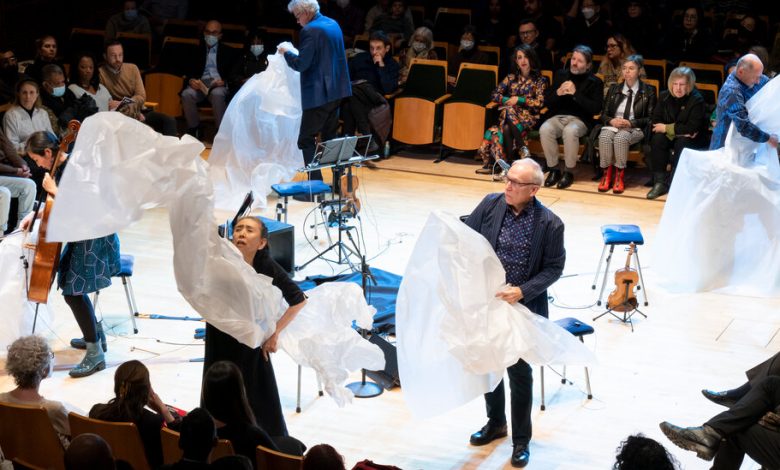Review: Kronos Quartet Offers a Creative Snapshot of a Global Pandemic

No one is ever going to say that Kronos Quartet is satisfied with the string quartet status quo. This group, founded nearly 50 years ago by violinist David Harrington, has, in its malleable virtuosity, become a wellspring for hundreds of new music commissions. Some of those have become iconic pieces of repertoire; others have provided real-time snapshots of creative collaborations. True to form, this Kronos program at Zankel Hall featured nine new and recent works, nearly all written during the past three years. It offered a wide palette of sonic ideas and creative visions, though some were more fully formed than others.
Many of the works on the Zankel program were brief but transporting. The Benin-born composer and singer Angélique Kidjo’s “YanYanKliYan Senamido #2,” arranged by Jacob Garchik, provided an easefully exuberant start to the evening, with interlocked melodies and rhythms playing call-and-response. The Iranian composer Aftab Darvishi’s “Daughters of Sol” was a profoundly meditative study on shade and color, with each layer unfolding slowly into another. The Armenian-American composer Mary Kouyoumdjian’s “I Haven’t the Words” was a restless, questioning susurration precipitated by the tumults of 2020, including the pandemic lockdowns and George Floyd’s murder.
The movement-based interdisciplinary artist Eiko Otake entered Zankel for the world premiere of her “eyes closed” with the regality of a one-woman procession, carrying a clutch of large plastic sheets. She distributed them to Harrington, violinist John Sherba and violist Hank Dutt. They became her fellow dancers, twisting and fluttering the sheets into three-dimensional shapes. The conceit was spectacularly imaginative: the sheets had enough form to become both dynamic sculptures and, in their murmured crinkling, significant percussive accompaniment for occasional wails from Sunny Yang’s cello. (The elegiac visual effect was not unlike the plastic bag scene from the film “American Beauty.”)
Some works didn’t cohere quite as completely. Mazz Swift’s “She Is a Story, Herself” included several exciting moments, such as flitting small melodic ideas that subsided into a graceful chorale, but the piece overall did not feel fully conceptualized. Canadian composer Nicole Lizée’s “Zonelyhearts,” a lengthy homage to “The Twilight Zone,” tacked wildly between willful wackiness — including using Pop Rocks (yes, the classic 1970s candy) as a form of percussion, amplified with the performers’ open mouths nestled up to microphones — and existential musings on censorship and surveillance.
The quartet played in Zankel Hall’s temporarily reconfigured, in-the-round seating arrangement. While this setup provided a real sense of intimacy and communal gathering, it also meant that it was hard for a large portion of the audience, myself included, to see three composer/guest musicians who performed their own works alongside Kronos. Instead, we saw only their backs. I overheard nearby concertgoers lamenting that they couldn’t really view such instruments as Soo Yeon Lyuh’s haegeum, a hoarsely voiced, two-stringed and bowed Korean instrument used in her sweetly nostalgic piece “Yessori (Sound from the Past),” or the 16-stringed dan bau, the Vietnamese zither played by the virtuoso Van-Anh Vo in her pandemic-era piece “Adrift,” in which the musicians circle around each other melodically, grounded by a walking bass line plucked out by the cello. Nor could we fully appreciate the facial expressions and hand gestures of Peni Candra Rini, the composer and singer from the East Java province of Indonesia who appeared with the quartet in her wistful piece “Maduswara,” also arranged by Garchik.
With zero fanfare, this Kronos program included music by eight female composers and one who is nonbinary; many are people of color. (In 2023, such a program would still be lamentably rare at many venues. Carnegie Hall had pledged to give a particular limelight to female performers and composers this season.) What Harrington did note proudly from the stage is that Kidjo, Candra Rini, Darvishi and Lyuh’s pieces were works created for Kronos’s engaging and inspired 50 for the Future commissioning project, which has put 50 recent compositions in the hands of young and emerging ensembles without cost online.
This concert also marked the final New York City Kronos Quartet appearance for the cellist Sunny Yang, who has been part of the ensemble for the past decade. (Next month, the group will welcome Paul Wiancko in that chair.) As an encore, the group played Laurie Anderson’s “Flow”; in this context, her short, tender work felt like a benediction.
Kronos Quartet
Performed on Friday at Zankel Hall, Manhattan.